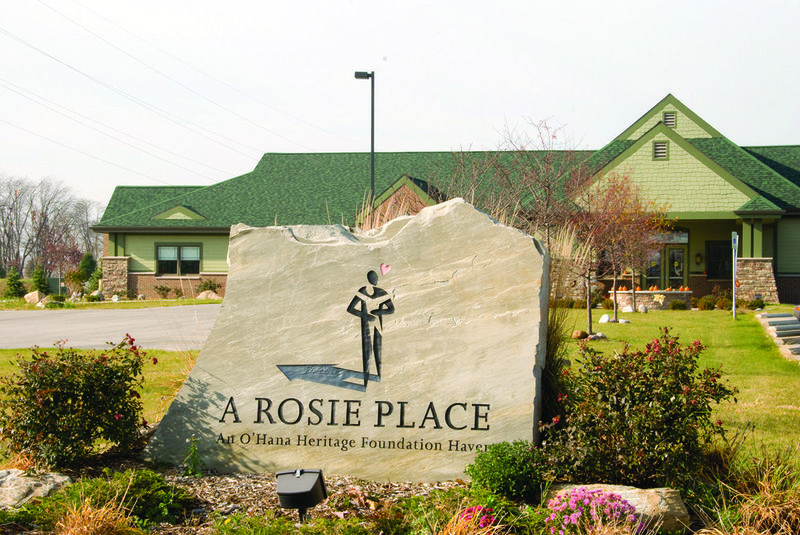 Courtesy of A Rosie Place
Courtesy of A Rosie Place
A Rosie Place might have emerged from the fantastical imaginations of our childhood selves, for it is a dreamy sort of haven: a large “home” situated on five scenic acres on the western outskirts of South Bend. It is purpose-built for fun activities attended by grown-ups as patient and doting as our grandparents.
The bedrooms are decorated according to magical evocations of the natural world: Moonscape Mountain, The Harbor, Sunny Meadow, Barefoot Beach, Jungle Playground, Desert Dreams. Even the three customized restrooms are themed — the Pond, the Waterfall, the River. For many of the children, staying at A Rosie Place is their first sleepover where they can make friends, share meals, bake cookies, play outside, have adventures, enjoy parties, paint, take bubble baths and have the freedom to make choices.
If this description of A Rosie Place makes it sound like a Narnia come to life, it’s because it too is the manifestation of dreams — those of a wide-ranging group of South Bend-area physicians, teachers, homecare professionals and administrators who have in common the experience of working with medically fragile children. This group, including Dr. Bunmi Okanlami ’08MBA, who was then medical director of Memorial Hospital’s pediatric intensive care unit, incorporated as the nonprofit O’Hana Heritage Foundation in 2003. After years of intense planning and fundraising, they opened A Rosie Place in 2011. It is the only licensed hospital in Indiana dedicated solely to medically fragile children.
Children who are medically fragile require a skilled level of care to meet their everyday needs. They may need a tube to breathe or eat and highly specialized treatments and therapies to maintain their health status. Diagnoses such as neuromuscular disease, brain injury, spina bifida, premature birth or uncontrolled seizure disorder may establish the medically fragile condition.
An estimated 2,000 medically fragile children live in northern Indiana. Thanks in part to advances in medicine and technology, many such children are living longer than they used to. In the past, they might never have left the hospital. Their complex health conditions demand around-the-clock care, which can place significant hardships on their families. Parents and siblings become lifelong caregivers, leaving them little time or energy to focus on each other’s needs — or their own.
The stress takes a serious toll. Nationally, between 40 percent and 70 percent of family caregivers have clinical symptoms of depression, while the parents of medically fragile children face an 80 percent chance of divorce, compared to 50 percent in the general population.
One great need is a place where the medically fragile child can receive quality care while their families find relief from the emotional, physical and financial pressure of constant care. At A Rosie Place, the staff recognizes parents’ double bind: They crave this break from their responsibilities but want to be reassured that they can entrust them to someone else. Earning that trust has made A Rosie Place successful.
While A Rosie Place is a licensed hospital capable of attending to the most challenging pediatric medical issues, its staff emphasizes what they call the “home away from home” environment. It extends from the colorful nature murals that cover every wall to the saltwater aquarium at the entrance and the pond and waterfall outdoors. The effect is bright and airy, a lightness of being. Doctors and nurses make sure the visit is safe, while the child’s experience revolves around the cultivation of joy.
Mishawaka parent Jenni Blye calls it a godsend. Her daughter, Katie Joy, was born with spina bifida, which has caused hydrocephalus, a buildup of fluid in the brain, along with several other medical issues, including paralysis. “A Rosie Place can do all of the things Katie Joy needs on a medical level,” says Blye, including her daughter’s complex bladder and bowel routine. “But they also take care of her on a fun level.”
Adults might recall the anticipation they felt as kids looking forward to a special event — a slumber party with cousins or classmates, a weekend with Grandma, camping with Mom or Dad. Katie Joy “adores the nurses and support staff,” says Blye. “She talks about them constantly, like they’re extra members of her family. She is so excited to see them and have sleepovers and tea parties with them. It’s that fun group of people in her life that she loves to be with.”
There are broader benefits. “Not only do I get a break, but Katie gets a break from me,” says Blye. “And because of A Rosie Place, my husband and I are able to have date nights which we couldn’t have before. We spend quality time with our older daughter, which we couldn’t do before. And my mental health is much better when I have a break.”
Meanwhile, Katie Joy becomes a member of her own community — an extension of her family, her home away from home, something to happily dream about, to look forward to, to live for. And the majority of the funding comes from the gifts of local individuals, organizations and foundations — with zero expense for the families.
David Chaudoir is a writer and anthropologist.